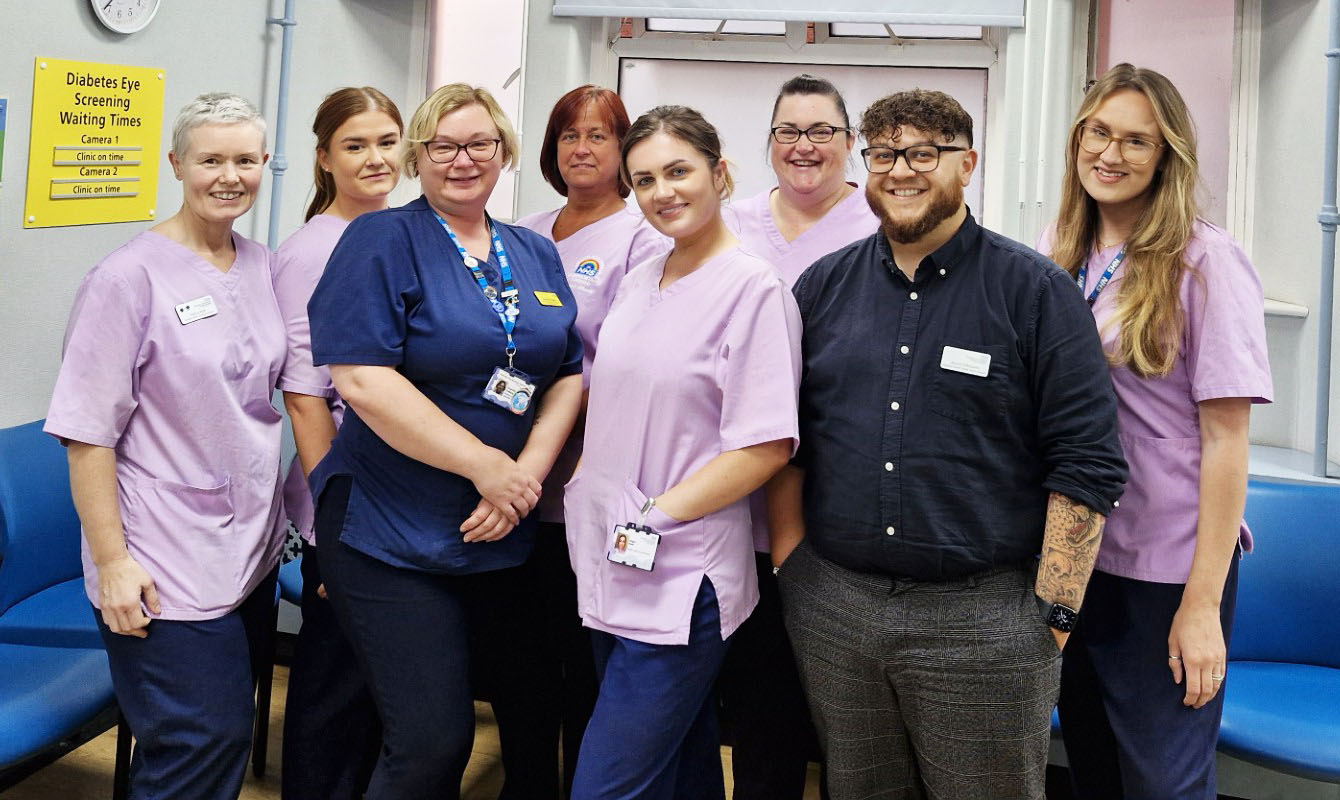An audit of GP practices in Doncaster revealed that patients at The Flying Scotsman Surgery had the lowest uptake of diabetic eye screening appointments in the city. In response, a representative from the Diabetic Eye Screening Programme (DESP) at DBTH met with the practice manager to discuss ways to collaborate and increase attendance rates, ensuring that all patients have equitable access to this crucial screening service.
A key factor contributing to the lower uptake was the surgery’s patient demographic, which includes a high proportion of individuals from Eastern European backgrounds, many of whom are non-English speaking. Data revealed that approximately 60% of repeat non-attenders from the surgery were Eastern European, highlighting a health inequality that needed urgent attention.
To tackle this issue, the DESP team, led by Jemima Beaumont, Failsafe and Engagement Lead within Doncaster and Bassetlaw Diabetic Eye Screening Programme, collaborated with The Flying Scotsman Surgery to run a “Did Not Attend” (DNA) clinic directly at the GP practice.
By bringing mobile screening equipment directly to the surgery, the team made the service more accessible for patients who may find hospital appointments challenging to attend. This approach supports DBTH’s wider strategy to bring essential healthcare services into the heart of communities that need them most, aligning with the Trust’s broader Tackling Health Inequalities Strategy.
The initiative also included sending simplified, easy-to-read appointment letters on bright yellow paper, accompanied by translated documents in Romanian, Arabic, Polish, and Russian. The GP practice further supported the project by making pre-call reminders and sending text messages to patients, ensuring communication was clear and engaging.
The first clinic, held on 13 September 2024, saw a patient attendance rate of 36.3%, with 62.5% of attendees showing signs of diabetic diabetic retinopathy in their screening images. A second clinic, conducted on 4 October 2024, achieved an even higher attendance rate of 55.5%, with 40% of those screened showing evidence of the condition.
This project follows in the footsteps of similar successful initiatives, such as the “Super Saturday” clinic last year, which took place at Doncaster Rovers’ ground, specifically targeting individuals who had not attended screening for over two years. This outreach effort, aimed at detecting potentially sight-threatening diabetic retinopathy, had a fantastic turnout and raised awareness about the importance of regular screenings in preventing blindness in people with diabetes.
Jemima Beaumont, Failsafe and Engagement Lead for the Doncaster and Bassetlaw Diabetic Eye Screening Programme, said: “We’re really proud of this collaboration with The Flying Scotsman Surgery. It’s important to make our services as accessible as possible, especially for those who face language barriers or may find attending hospital difficult. The success of these clinics highlights how vital it is to bring services to where patients are and make healthcare equitable for everyone. We’ve seen real engagement from the community, and we hope to continue building on this work.”
Richard Woodhouse, Health Inequalities Development Manager, added: “This initiative is a fantastic example of how targeted interventions can make a real difference in addressing health inequalities. By working closely with local practices like The Flying Scotsman Surgery and tailoring services to the needs of the community, we can ensure that everyone has equal access to essential care. The high attendance rates and significant findings in these clinics show just how important it is to continue these efforts.”
DBTH is committed to reducing health inequalities and improving access to vital services like diabetic eye screening, forming part of a broader effort to tackle health disparities within the local population.
By addressing the specific needs of underrepresented groups, The Trust aims to ensure that all patients, regardless of their background, have the opportunity to receive the care they need as part of its ongoing health inequalities strategy.




